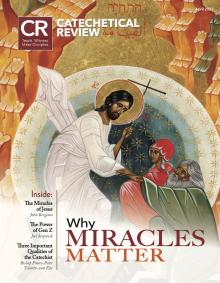The General Directory for Catechesis (1997) and the National Directory for Catechesis (2005)
General Directory for Catechesis (1997)
In light of the publication of the Catechism, it was decided that the General Catechetical Directory (GCD) was in need of revision. A portion of the task was given to the Congregation for the Clergy’s International Catechetical Commission (COINCAT). Even before the members and experts of COINCAT gathered, a thorough, international consultation on the proposed revision of the GCD had been conducted. The presidents of episcopal conference catechetical commissions, representatives of catechetical institutes and organizations throughout the world, and the members of COINCAT were asked to respond to a series of specific questions relating to a proposed revision of the GCD. Those responses were collated by the staff of the Congregation for the Clergy and woven into the Instrumentum Laboris, a document over seventy pages in length. The Instrumentum Laboris reflected three fundamental perspectives on the proposed revision of the GCD. The first seemed to advise only a slight revision, the second a moderate revision, and the third a more substantial rewrite.
The Ninth Plenary Session of COINCAT was held in Rome in September of 1994. Jose Cardinal Sanchez, prefect of the Congregation for the Clergy and president of COINCAT, called upon Archbishop Sepe, the Congregation’s secretary, to provide the more specific outline of COINCAT’s work for the week. In this outline, Archbishop Sepe first addressed the necessity for the revision of the GCD. He noted that it had been almost twenty-five years since its publication, that several important magisterial documents had been issued, and that much renewal had been undertaken within the ministry of the Word. He also pointed out that the pope had issued the call for a “New Evangelization,” that there had been significant development in the catechetical sciences, and that the Catechism had been recently published. Quoting Pope John Paul II in Catechesi Tradendae, Archbishop Sepe underscored the importance of the GCD and the need for its revision: “a Directory remains a fundamental document for the stimulation and orientation of the renewal of catechesis in the whole Church . . . it remains the norm of reference.”[1]
Archbishop Sepe then provided the parameters for the revision of the GCD. Based on the findings of the surveys, a moderate revision was indicated. That meant that all material that remained useful and relevant would be included in the revision; the universal character of the document would be preserved; and the information contained in magisterial documents published after the GCD would be incorporated where possible. Also, the Catechism would thoroughly inform the revision.[2]
The provisional scheme for the revised GCD has an introduction, five parts, and a conclusion. The general outline is as follows:
Introduction: The Purpose of the General Catechetical Directory
Part One: The Ministry of the Word of God
Part Two: The Christian Message
Part Three: The Pedagogy of the Faith
Part Four: Those to Whom the Catechesis Is Directed
Part Five: Catechesis in the Pastoral Action of the Church
Conclusion: Catechesis: The Work of the Holy Spirit[3]
The work of revising the GCD was divided into three main segments: Part One and the conclusion, Parts Two and Three, and Parts Four and Five, with one day of COINCAT’s plenary session spent on each. The last day would be spent formulating a table of contents for the revised Directory and suggesting the next steps to take for the timely completion of the project.
To this provisional scheme the working group added some criteria for redaction of the GCD. These criteria did not have the benefit of revision within the working group because there simply was not enough time to do so. Therefore, the criteria were understood as a provisional first draft subject to later revision. They were as follows:
- Continuity and enrichment. The present General Catechetical Directory comes with valuable elements. We should seek improvement by adding that which seems to be necessary.
- Be mindful of events that followed the publication of the General Catechetical Directory in 1971: the two synods regarding catechesis; the apostolic exhortations Evangelii Nuntiandi and Catechesi Tradendae; the 1983 Code of Canon Law; the encyclicals Redemptoris Missio and Veritatis Splendor; and finally, the publication of the Catechism.
- In the new structure of the General Catechetical Directory there are elements that should be replaced in view of a new synthetic ordering.
- Literal citations of the documents of the Magisterium should be placed in the new text.
- The four parts should be presented as criteria of the unity of life in Christ, the aim of catechesis.[4]
The rest of this online article is available for current Guild members.
This article is from The Catechetical Review (Online Edition ISSN 2379-6324) and may be copied for catechetical purposes only. It may not be reprinted in another published work without the permission of The Catechetical Review by contacting [email protected]

















